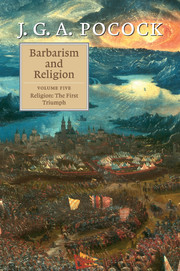Book contents
- Frontmatter
- Contents
- Preface
- Acknowledgements
- Advice to readers
- List of abbreviations
- Introduction
- PART I GIBBON'S ORTHODOX SOURCES
- PART II THE SOURCES OF PROTESTANT ENLIGHTENMENT
- 3 Jean Le Clerc and the history of language
- 4 The Historia Ecclesiastica and the later works of Le Clerc
- 5 Isaac de Beausobre: heresy, philosophy, history
- 6 Johann Lorenz von Mosheim: modern ecclesiastical historian
- PART III THE TWO CHAPTERS EXPLORED
- PART IV CONTROVERSY AND CONTINUATION
- Bibliography
- Index
6 - Johann Lorenz von Mosheim: modern ecclesiastical historian
Published online by Cambridge University Press: 01 March 2011
- Frontmatter
- Contents
- Preface
- Acknowledgements
- Advice to readers
- List of abbreviations
- Introduction
- PART I GIBBON'S ORTHODOX SOURCES
- PART II THE SOURCES OF PROTESTANT ENLIGHTENMENT
- 3 Jean Le Clerc and the history of language
- 4 The Historia Ecclesiastica and the later works of Le Clerc
- 5 Isaac de Beausobre: heresy, philosophy, history
- 6 Johann Lorenz von Mosheim: modern ecclesiastical historian
- PART III THE TWO CHAPTERS EXPLORED
- PART IV CONTROVERSY AND CONTINUATION
- Bibliography
- Index
Summary
THE STRUCTURES OF A CHURCH HISTORY
Of the three Protestant masters named by Gibbon, the last is the most completely a historian as the term was understood then, or may be now. Le Clerc's Historia Ecclesiastica is incomplete and stops short of Gibbon's concerns; Beausobre's Histoire critique is a history in the sense of an enquiry, not a narrative. Mosheim in the two last of his works achieved a history of the Christian Church on the same scale as Fleury's, from Christ to the present; and while not equal to Tillemont for detail and erudition, he did not share Fleury's need to affirm the unbroken chain of authority as well as veracity. As a Protestant, he saw the Church's history as largely that of a usurpation, and this necessarily increased his willingness to give central place to contingency and circumstance. Some Protestants still insisted that papal ascendancy had been the work of Antichrist, but Mosheim was able to present it as the outcome of unintended consequences and circumstantial changes, such as might, indeed must, occur in the history of any human association. The balance between spiritual and secular causes, which Gibbon was to be seen as having radically disturbed, was already wavering in Mosheim's narrative, but did not in the least challenge his or his readers' Christian orthodoxy. It seems, however, that he may have been better known among his English readers than in his own country.
- Type
- Chapter
- Information
- Barbarism and Religion , pp. 163 - 212Publisher: Cambridge University PressPrint publication year: 2011



